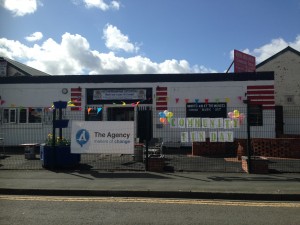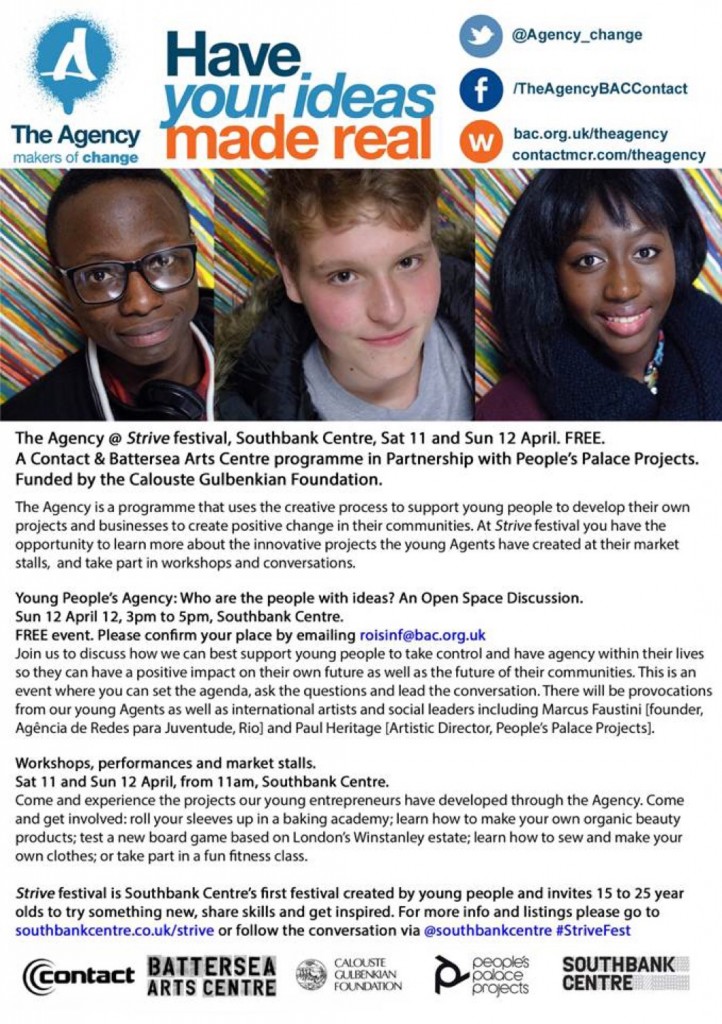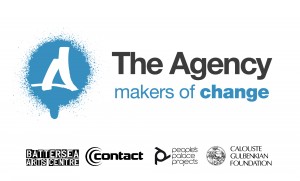A sense of Agency…
Post by Naomi Paxton
On Saturday 11th April, the Agency project held a Fun Day at the Miners Community Arts and Music Centre in Moston, North Manchester. The event was open to the whole community and was a showcase for the work of five young Agents the project developed and supported – Adem, Molly, Victor, Michael and Rosemary. The Miners was a hive of activity – there was a DJ, a bouncy castle, a face-painter, a cake decorating competition and a fashion show amongst the entertainments.
The Agency was started by Marcus Faustini in Brazil in 2010 as a project to support and develop young people and entrepreneurship in their local communities. Since 2013, Faustini’s been an integral part of adapting and translating the methodology of the Agency for two communities far removed from the favelas in Rio de Janeiro where it was developed. Two organisations in the UK, Contact in Manchester and Battersea Arts Centre in London, collaborated with People’s Palace Projects to bring the Agency in areas of economic deprivation near them – Contact chose to work in Moston and Harpurhey, North Manchester whilst Battersea Arts Centre based their work in Clapham and Battersea, South London. The projects were funded by the Gulbenkian Foundation.
For Contact, who have a portfolio of arts and theatre projects that work with young people, the Agency ‘aims to empower young people to effect positive change in their own communities’ and through the Agency ‘young people develop their ideas into projects to change where they live for the better, with support from successful people with relevant expertise and their community.’ The project runs over two cycles. I joined the Agency as part of the Poor Theatres research in the second cycle, in which the focus is very much on developing business ideas over a pre-determined timeline. Initially it seemed that the first cycle, in which the creative processes are more prevalent would be something I’d be instinctively more drawn to, but because of this I was glad to be in the second cycle and to see the business ideas develop into reality.
Going to the Miners each week was a joy and a travel ‘experience’ – I tried every way to get there on public transport, relying on trams and trains for weeks and finally discovering only in the last week that the bus was the quickest (if not the cheapest) way! It’s a fantastic venue, buzzing with energy. Louis and his team are friendly, practical, funny and clearly passionate about their community and the Miners as a community arts venue. The whole place felt alive and full of optimism and potential – from the changing displays of art on the walls of the main room used by the Agency to the sounds of preparations for gigs, parties and events going on in other rooms.
The first week I was there, on 7th February, a journalist and photographer from the Daily Telegraph were interviewing the Agents and the project team from Contact. The article came out on 28th March and the facilitation team made time in the Saturday session to debrief the article with the Agents, talking about stereotypes, media spin and how they could use this to their advantage in the future. Discussions like this – practicalities, preconceptions and empowerment – were a feature of the second cycle. Lucy from Contact gave a session about fundraising in week 3 which included tips on researching funding sources and tailoring applications; Sissy Rooney, the founder of Street Style Surgery came in week 4 to talk to the Agents about her own entrepreneurship, failure and success, whilst the session in week 6 included a talk from Dil Sidhu, the Chief External Officer of Manchester Business School, who had been part of the panel at the end of the first cycle. Although his slick, expensive suit and business charm seemed initially out of place at the Miners, his interest in the Agents and passion for helping them move their ideas forward in a realistic timeline was clear. Sidhu talked about how the Agents should approach and speak to potential investors, how they should brand and market their ideas and, crucially, reasons why businesses fail to move with the times and sometimes fail completely. The Agents were treated as young entrepreneurs and business people and seemed in turn to respect this expert advice.
Short bursts of attention, however, seemed to dominate the sessions. Despite the passion that must have got the young agents through the panel process, for the most part the heart and soul I saw came from the facilitation and creative team and not from the Agents themselves. The peer mentors were the ones promoting the work on social media, writing blog posts, taking pictures of sessions, researching and buying equipment and doing much of the leg work of the necessary practicalities and preparations. Of all the Agents the youngest, Rosemary, seemed the most dedicated, with a clear idea of future plans in education and business and a strong work ethic. Her peer mentor, Jess, had been brought in by Contact to support her work in the second cycle and they made a good team.
On Sunday 12th April, the day after the Fun Day at the Miners, the Agents and the Contact team came to London’s South Bank Centre to take part in the Strive Festival. The morning began with a panel session in the Clore Ballroom called Breaking Through: Finding Your Feet in the Creative Industries which was unfortunately sparsely attended, by both the Agents and the public. However the passion and dedication of the speakers, particularly Reece Williams, one of the Peer Mentors from the Agency in Manchester who had been roped in to speak at the last minute was palpable. Alongside Reece, the panel included a film producer and director, a community ambassador with experience at the Bush Theatre and Lyric Hammersmith and one of the South Bank Centre’s creative producers. They spoke about the need for the new generation of creative entrepreneurs to remain open to new ideas and opportunities, to keep momentum going and not to undervalue their work. It was an inspiring session, full of practical tips and the sharing of lived experience from young people who wanted to encourage others to move their ideas forward.
The Agents from both London and Manchester were spread out around the building, meaning that small pockets of people were isolated in different areas. It struck me how exposed the young Agents were – in the safe environs of the Miners the ideas seemed huge and robust, but in the larger, more open and less personal space of the South Bank Centre I was aware of how young and vulnerable the Agents seemed. As well as those who had come specifically for the Strive Festival, there were tourists and Londoners mooching around the building who were mildly interested in the Agents and their stalls, but there were times when the Agents seemed happier for their mentors to take charge whilst they either stood by silently or disappeared. I was surprised by how little their stalls seemed to show off their practical ideas, and how small scale they looked. ‘Crumbs,’ a baking project had a few biscuits; ‘By Sydney Rose’ sewing academy offered passers-by the opportunity to make bow ties with superglue, not needlecraft; ‘Artist’s Avenue,’ the public art project had lots of pictures, but few written explanations of what the project was about. This seemed a missed opportunity to me – and a total contrast to the Agency Fun Day the day before on their home turf. The London Agents seemed much more confident – louder, more energised and keen to talk and engage. They made numerous and lengthy contributions to the two hour open discussion group held on the Sunday afternoon, eager to share their experiences and not at all intimidated by the presence of so many strangers. Unfortunately not all the Moston Agents attended the session and those that did made no contribution to the open discussion. I assumed shyness, rather than apathy or boredom hindered them but it seemed another missed opportunity – the room was filled with adults working with young people in economically deprived communities hungry to talk, engage, debate and exchange ideas with a diverse group and the missing voices were those of the Moston Agents, who had much potentially to share and say about their experiences. Faustini and some of the original participants in the Agency project in Brazil were present and spoke about the need to fight against the perception of young people as disengaged and a problem that society doesn’t know how to solve, emphasizing the need for engagement in structured and supportive creative environments outside of school or college and challenging negative narratives that damage perceptions of young people in and out of their communities.
I feel very fortunate to have experienced a little of the methodology of the Agency, witnessed the dedication and care of the Contact team and been able to visit the Miners. There is clearly a huge desire amongst those initiating, running and supporting the project to contribute to positive change in the communities they are working in and to empower and enable young people to achieve, despite their economic circumstances. Both Contact and Battersea Arts Centre are currently seeking new funding to support a third year of the Agency project and looking at how it can be extended into more communities. I very much hope they succeed.
Interested in finding out more?
Watch interviews with The Agency team for the Poor Theatres project
Read the Daily Telegraph feature on The Agency




Comments are closed
Sorry, but you cannot leave a comment for this post.